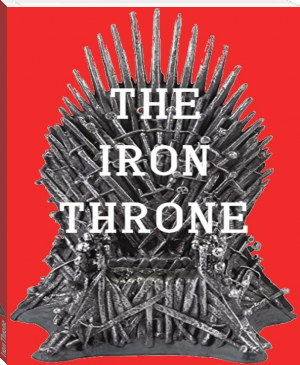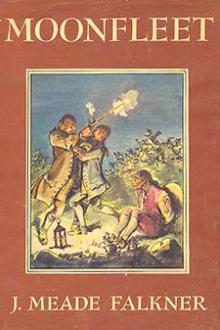Iron Throne, Ellen Gould-Harmon [rm book recommendations txt] 📗

- Author: Ellen Gould-Harmon
Book online «Iron Throne, Ellen Gould-Harmon [rm book recommendations txt] 📗». Author Ellen Gould-Harmon
Another who participated in the movement testified: "It produced everywhere the most deep searching of heart and humiliation of soul before the God of high heaven. It caused a weaning of affections from the things of this world, a healing of controversies and animosities, a confession of wrongs, a breaking down before God, and penitent, brokenhearted supplications to Him for pardon and acceptance. It caused self-abasement and prostration of soul, such as we never before witnessed. As God by Joel commanded, when the great day of God should be at hand, it produced a rending of hearts and not of garments, and a turning unto the Lord with fasting, and weeping, and mourning. As God said by Zechariah, a spirit of grace and supplication was poured out upon His children; they looked to Him whom they had pierced, there was a great mourning in the land, . . . and those who were looking for the Lord afflicted their souls before Him."--Bliss, in Advent Shield and Review, vol. I, p. 271 (January, 1845).
Of all the great religious movements since the days of the apostles, none have been more free from human imperfection and the wiles of Satan than was that of the autumn of 1844. Even now, after the lapse of many years, all who shared in that movement and who have stood firm upon the platform of truth still feel the holy influence of that blessed work and bear witness that it was of God. At the call, "The Bridegroom cometh; go ye out to meet Him," the waiting ones "arose and trimmed their lamps;" they studied the word of God with an intensity of interest before unknown.
Angels were sent from heaven to arouse those who had become discouraged and prepare them to receive the message. The work did not stand in the wisdom and learning of men, but in the power of God. It was not the most talented, but the most humble and devoted, who were the first to hear and obey the call. Farmers left their crops standing in the fields, mechanics laid down their tools, and with tears and rejoicing went out to give the warning. Those who had formerly led in the cause were among the last to join in this movement. The churches in general closed their doors against this message, and a large company of those who received it withdrew from their connection. In the providence of God this proclamation united with the second angel's message and gave power to that work.
The message, "Behold, the Bridegroom cometh!" was not so much a matter of argument, though the Scripture proof was clear and conclusive. There went with it an impelling power that moved the soul. There was no doubt, no questioning. Upon the occasion of Christ's triumphal entry into Jerusalem the people who were assembled from all parts of the land to keep the feast flocked to the Mount of Olives, and as they joined the throng that were escorting Jesus they caught the inspiration of the hour and helped to swell the shout: "Blessed is He that cometh in the name of the Lord!" Matthew 21:9. In like manner did unbelievers who flocked to the Adventist meetings--some from curiosity, some merely to ridicule--feel the convincing power attending the message: "Behold, the Bridegroom cometh!"
At that time there was faith that brought answers to prayer--faith that had respect to the recompense of reward. Like showers of rain upon the thirsty earth, the Spirit of grace descended upon the earnest seekers. Those who expected soon to stand face to face with their Redeemer felt a solemn joy that was unutterable. The softening, subduing power of the Holy Spirit melted the heart as His blessing was bestowed in rich measure upon the faithful, believing ones.
Carefully and solemnly those who received the message came up to the time when they hoped to meet their Lord. Every morning they felt that it was their first duty to secure the evidence of their acceptance with God. Their hearts were closely united, and they prayed much with and for one another. They often met together in secluded places to commune with God, and the voice of intercession ascended to heaven from the fields and groves. The assurance of the Saviour's approval was more necessary to them than their daily food; and if a cloud darkened their minds, they did not rest until it was swept away. As they felt the witness of pardoning grace, they longed to behold Him whom their souls loved.
But again they were destined to disappointment. The time of expectation passed, and their Saviour did not appear. With unwavering confidence they had looked forward to His coming, and now they felt as did Mary when, coming to the Saviour's tomb and finding it empty, she exclaimed with weeping: "They have taken away my Lord, and I know not where they have laid Him." John 20:13.
A feeling of awe, a fear that the message might be true, had for a time served as a restraint upon the unbelieving world. After the passing of the time this did not at once disappear; at first they dared not triumph over the disappointed ones; but as no tokens of God's wrath were seen, they recovered from their fears and resumed their reproach and ridicule. A large class who had professed to believe in the Lord's soon coming, renounced their faith. Some who had been very confident were so deeply wounded in their pride that they felt like fleeing from the world. Like Jonah, they complained of God, and chose death rather than life. Those who had based their faith upon the opinions of others, and not upon the word of God, were now as ready again to change their views. The scoffers won the weak and cowardly to their ranks, and all these united in declaring that there could be no more fears or expectations now. The time had passed, the Lord had not come, and the world might remain the same for thousands of years.
The earnest, sincere believers had given up all for Christ and had shared His presence as never before. They had, as they believed, given their last warning to the world; and, expecting soon to be received into the society of their divine Master and the heavenly angels, they had, to a great extent, withdrawn from the society of those who did not receive the message. With intense desire they had prayed: "Come, Lord Jesus, and come quickly." But He had not come. And now to take up again the heavy burden of life's cares and perplexities, and to endure the taunts and sneers of a scoffing world, was a terrible trial of faith and patience.
Yet this disappointment was not so great as was that experienced by the disciples at the time of Christ's first advent. When Jesus rode triumphantly into Jerusalem, His followers believed that He was about to ascend the throne of David and deliver Israel from her oppressors. With high hopes and joyful anticipations they vied with one another in showing honour to their King. Many spread their outer garments as a carpet in His path, or strewed before Him the leafy branches of the palm. In their enthusiastic joy they united in the glad acclaim: "Hosanna to the Son of David!" When the Pharisees, disturbed and angered by this outburst of rejoicing, wished Jesus to rebuke His disciples, He replied: "If these should hold their peace, the stones would immediately cry out." Luke 19:40. Prophecy must be fulfilled. The disciples were accomplishing the purpose of God; yet they were doomed to a bitter disappointment. But a few days had passed ere they witnessed the Saviour's agonizing death, and laid Him in the tomb. Their expectations had not been realized in a single particular, and their hopes died with Jesus. Not till their Lord had come forth triumphant from the grave could they perceive that all had been foretold by prophecy, and "that Christ must needs have suffered, and risen again from the dead." Acts 17:3.
Five hundred years before, the Lord had declared by the prophet Zechariah: "Rejoice greatly, O daughter of Zion; shout, O daughter of Jerusalem: behold, thy King cometh unto thee: He is just, and having salvation; lowly, and riding upon an ass, and upon a colt the foal of an ass." Zechariah 9:9. Had the disciples realized that Christ was going to judgment and to death, they could not have fulfilled this prophecy. In like manner Miller and his associates fulfilled prophecy and gave a message which Inspiration had foretold should be given to the world, but which they could not have given had they fully understood the prophecies pointing out their disappointment, and presenting another message to be preached to all nations before the Lord should come. The first and second angel's messages were given at the right time and accomplished the work which God designed to accomplish by them.
The world had been looking on, expecting that if the time passed and Christ did not appear, the whole system of Adventism would be given up. But while many, under strong temptation, yielded their faith, there were some who stood firm. The fruits of the advent movement, the spirit of humility and heart searching, of renouncing of the world and reformation of life, which had attended the work, testified that it was of God. They dared not deny that the power of the Holy Spirit had witnessed to the preaching of the second advent, and they could detect no error in their reckoning of the prophetic periods. The ablest of their opponents had not succeeded in overthrowing their system of prophetic interpretation. They could not consent, without Bible evidence, to renounce positions which had been reached through earnest, prayerful study of the Scriptures, by minds enlightened by the Spirit of God and hearts burning with its living power; positions which had withstood the most searching criticisms and the most bitter opposition of popular religious teachers and worldlywise men, and which had stood firm against the combined forces of learning and eloquence, and the taunts and revilings alike of the honourable and the base.
True, there had been a failure as to the expected event, but even this could not shake their faith in the word of God. When Jonah proclaimed in the streets of Nineveh that within forty days the city would be overthrown, the Lord accepted the humiliation of the Ninevites and extended their period of probation; yet the message of Jonah was sent of God, and Nineveh was tested according to His will. Adventists believed that in like manner God had led them to give the warning of the judgment. "It has," they declared, "tested the hearts of all who heard it, and awakened a love for the Lord's appearing; or it has called forth a hatred, more or less perceivable, but known to God, of His coming. It has drawn a line, . . . so that those who will examine their own hearts, may know on which side of it they would have been found, had the Lord then come--whether they would have exclaimed, 'Lo! this is our God, we have waited for Him, and He will save us;' or whether they would have called to the rocks and mountains to fall on them to hide them from the face of Him that sitteth on the throne, and from the wrath of the Lamb. God thus, as we believe, has tested His people, has tried their faith, has proved them, and seen whether they would shrink, in the hour of trial, from the position in which He might see fit to place them; and whether they would relinquish this world and rely with implicit confidence in the word of God."-- The Advent Herald and Signs of the Times Reporter, vol. 8, No. 14 (Nov 13, 1844).
The feelings of those who still believed that God had led them in their past experience are expressed in the words of William Miller: "Were I to live my life over again, with the same evidence that I then had, to be honest with God and man I should have to do as I have done." "I hope that I have cleansed my garments from the blood of souls. I feel that, as far as it was in my power, I have freed myself from all guilt in their condemnation." "Although I have been twice disappointed," wrote this man of God, "I am not yet cast down or discouraged. . . . My hope in the coming of Christ is as strong as ever. I have done only what, after years of solemn consideration, I felt it





Comments (0)